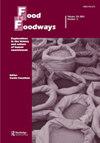Can selling traditional food increase food sovereignty for First Nations in northwestern Ontario (Canada)?
IF 1.1
Q2 ANTHROPOLOGY
引用次数: 4
Abstract
Abstract The disparity between rates of food insecurity experienced in households across Canada (8.3%) and in Indigenous households specifically (nearly half) is alarming. Many previous studies have demonstrated the physical, spiritual, mental, social and emotional benefits of consuming traditional foods (primarily wild animal food sources and wild edible plants), yet many Indigenous peoples in northern Ontario feel they do not have access to enough of them. Our research engaged in conversation with sixteen participants from four different First Nations communities in northern Ontario to explore the potential application of Greenland’s “Country Food Market” (CFM) as a model to increase accessibility of traditional food while maintaining community sovereignty over the resource. In this model, full-time hunters are financially sustained through selling their harvest at local markets. While participants were curious about the potential an economy around traditional food could have for improving access, this was tempered by cultural ethics, teachings and laws which instruct hunters to share their food and by concerns of resource overexploitation. As our research confirms, conversations and actions must move away from a binary approach to the question—either to sell or not to sell—and move toward a diverse range of economic models that center Indigenous peoples’ sovereignty.出售传统食品可以增加安大略省西北部原住民的粮食主权吗?
加拿大家庭(8.3%)和土著家庭(近一半)的粮食不安全率之间的差距令人担忧。许多先前的研究已经证明,食用传统食物(主要是野生动物食物来源和野生可食用植物)对身体、精神、心理、社会和情感都有好处,但安大略省北部的许多土著人民觉得他们没有足够的机会获得这些食物。我们的研究与来自安大略省北部四个不同的第一民族社区的16名参与者进行了对话,以探索格陵兰“乡村食品市场”(CFM)作为一种模式的潜在应用,以增加传统食品的可及性,同时保持社区对资源的主权。在这种模式下,全职猎人通过在当地市场出售他们的收获来维持经济。虽然参与者对围绕传统食物发展经济的潜力感到好奇,但由于文化伦理、教导和法律要求猎人分享他们的食物,以及对资源过度开发的担忧,这种想法受到了抑制。正如我们的研究证实的那样,对话和行动必须摆脱对这个问题的二元态度——要么卖,要么不卖——而转向以土著人民主权为中心的多种经济模式。
本文章由计算机程序翻译,如有差异,请以英文原文为准。
求助全文
约1分钟内获得全文
求助全文
来源期刊

Food and Foodways
ANTHROPOLOGY-
CiteScore
2.20
自引率
0.00%
发文量
16
期刊介绍:
Food and Foodways is a refereed, interdisciplinary, and international journal devoted to publishing original scholarly articles on the history and culture of human nourishment. By reflecting on the role food plays in human relations, this unique journal explores the powerful but often subtle ways in which food has shaped, and shapes, our lives socially, economically, politically, mentally, nutritionally, and morally. Because food is a pervasive social phenomenon, it cannot be approached by any one discipline. We encourage articles that engage dialogue, debate, and exchange across disciplines.
 求助内容:
求助内容: 应助结果提醒方式:
应助结果提醒方式:


